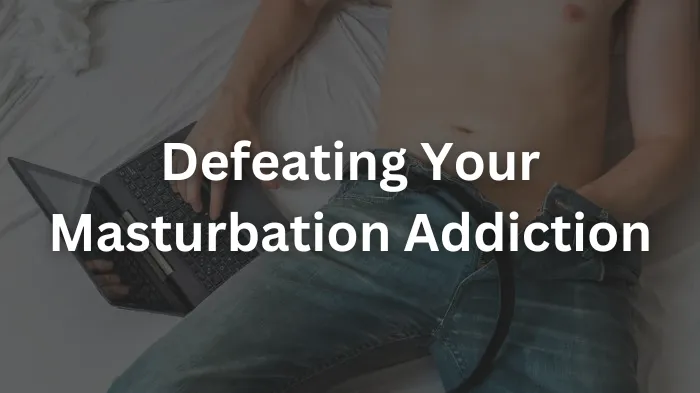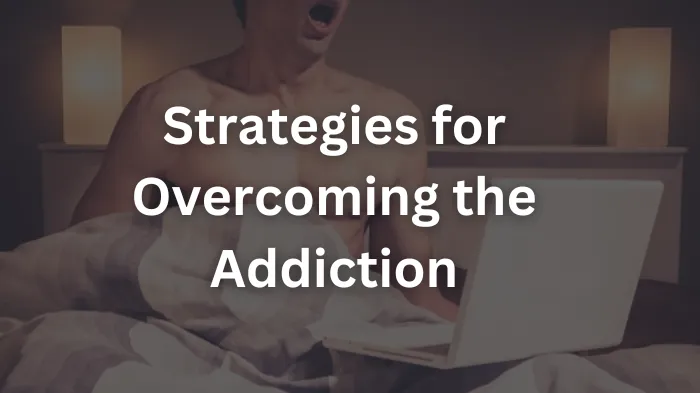
Masturbation addiction can be a challenging and isolating experience, but you're not alone. Many people struggle with this issue, and there are proven strategies to help you break free. In this article, we'll explore 10 effective techniques to overcome masturbation addiction and regain control over your life.
From understanding the root causes of your addiction to implementing healthy habits and seeking support, we'll cover everything you need to know to start your journey towards recovery. By the end of this article, you'll have a solid understanding of how to overcome masturbation addiction and improve your overall well-being. So, let's get started and shatter the cycle of addiction!
10 Steps to Conquer Masturbation Addiction
| Section | Description |
|---|---|
| 1. Recognizing the Behavior | Learn how to identify signs of masturbation addiction and understand its impact on your life. |
| 2. Physical and Psychological Effects | Explore the comprehensive effects of masturbation addiction on both body and mind. |
| 3. Addressing the Root Causes | Delve into the underlying factors contributing to the addiction and how to confront them. |
| 4. Emotional and Mental Triggers | Uncover the emotional and psychological triggers that can lead to compulsive behaviors. |
| 5. The Role of Mental Health Disorders | Understand the connection between masturbation addiction and mental health disorders. |
| 6. Strategies for Overcoming the Addiction | Discover 10 proven strategies to break the cycle of addiction and regain control. |
| 7. Seeking Professional Support | Learn about the importance of seeking help from healthcare professionals and therapy options. |
| 8. Lifestyle Changes for Recovery | Find out how making positive lifestyle adjustments can support your recovery journey. |
| 9. Developing Coping Mechanisms | Gain insights into effective coping strategies to manage urges and prevent relapse. |
| 10. The Importance of Support Networks | Highlight the significance of building a strong support network for encouragement and accountability. |
1. Recognizing the Behavior
Recognizing the behavior is the first and crucial step towards overcoming masturbation addiction. It's essential to become aware of your habits and patterns to start making positive changes. Pay attention to how often you masturbate, under what circumstances, and what triggers your behavior. Keeping a journal or tracking your habits can help you identify any patterns or trends.
Remember, there's no shame in acknowledging your addiction, and recognizing the behavior is a sign of strength and a commitment to change. By understanding your addiction, you can begin to take control and implement strategies to break the cycle. So, take a step back, observe your behavior, and get ready to make a change for the better.
2. Physical and Psychological Effects
Excessive masturbation can lead to a range of physical and psychological effects. Physically, individuals may experience chronic fatigue, body aches, chafed skin, penile pain, urinary tract infections, and other discomforts. Psychological effects can include changes in mood, feelings of shame or guilt, decreased levels of neurochemicals like dopamine and serotonin, and exacerbation of mental health issues such as depression and anxiety.
The following table outlines some of the key effects reported:
| Effect | Description |
|---|---|
| Fatigue | Feeling tired and lacking energy during the day |
| Neurochemical Imbalance | Decrease in pleasure-inducing neurochemicals |
| Physical Discomfort | Chafed skin, penile pain, etc. |
| Psychological Distress | Guilt, shame, mood changes, etc. |
3. Addressing the Root Causes
Addressing the root causes of your masturbation addiction is a crucial step towards recovery. These underlying factors can include stress, anxiety, boredom, or unresolved emotional issues. By identifying and addressing these root causes, you can tackle the problem at its source and reduce the urge to masturbate compulsively. One effective way to do this is through therapy or counseling, where you can work with a professional to explore the underlying issues and develop healthy coping mechanisms. Another approach is to engage in activities that bring you joy and fulfillment, such as hobbies, exercise, or socializing with friends.
By filling your time with positive and meaningful activities, you can reduce the likelihood of turning to masturbation as a coping mechanism. Remember, addressing the root causes of your addiction is not a one-time event but an ongoing process that requires patience, self-awareness, and commitment.
4. Emotional and Mental Triggers
Masturbation can often serve as a coping mechanism for individuals dealing with stress, anxiety, or other emotional difficulties. It may provide a temporary escape from reality or a way to deal with uncomfortable feelings. Recognizing these triggers is the first step in developing healthier coping strategies.
| Common Emotional Triggers | Potential Healthy Alternatives |
|---|---|
| Stress | Exercise, meditation |
| Anxiety | Deep breathing, mindfulness |
| Loneliness | Socializing, joining clubs/groups |
| Boredom | Hobbies, learning new skills |
Understanding one's own emotional triggers can lead to more effective treatment outcomes, as it allows individuals to seek out alternative activities that fulfill the same emotional needs without resorting to masturbation. Choosing therapy provides insights into how these underlying issues can be addressed through self-awareness and self-compassion.
5. The Role of Mental Health Disorders
Excessive masturbation may be symptomatic of hypersexuality, a mental health disorder characterized by an increased sex drive and an obsession with sexual thoughts and activities. It is important for individuals displaying signs of hypersexuality to seek professional help and therapy, as it could be indicative of deeper psychological issues.
Mental health professionals, such as therapists, counselors, or psychologists, offer various therapeutic approaches to help individuals cope with masturbation addiction. These may include cognitive-behavioral therapy, psychotherapy, and support groups that provide a platform to share experiences and learn from others facing similar challenges.
| Therapy Type | Description |
|---|---|
| Cognitive-Behavioral Therapy (CBT) | Focuses on changing negative thought patterns and behaviors |
| Psychotherapy | Provides a deep dive into emotional issues and past traumas |
| Support Groups | Offers a community of individuals with shared experiences |
6. Strategies for Overcoming the Addiction

Overcoming masturbation addiction involves a combination of personal resolve, strategic planning, and consistent effort. Key strategies include setting realistic goals and building healthy routines that foster both physical and mental well-being.
Setting Realistic Goals
Setting specific and achievable goals is an effective strategy for individuals looking to reduce the frequency of masturbation and regain control over their behavior. Gradual reduction rather than abrupt cessation can lead to sustainable change and better self-control. As advised by Addiction Resource, it's important to set goals that are challenging yet attainable, ensuring a sense of progress and accomplishment.
To implement this strategy:
- Identify current patterns: Keep a log to understand the frequency and triggers.
- Set initial targets: Decide on a realistic reduction in frequency.
- Adjust over time: Gradually lower the target as self-control improves.
- Celebrate milestones: Acknowledge successes to motivate continued effort.
Building Healthy Routines
Developing a structured daily routine can play a vital role in managing and overcoming masturbation addiction. This includes integrating activities that promote physical health, mental clarity, and emotional stability. As highlighted by Medical News Today, finding alternative activities and building a support system are beneficial.
Key aspects of a healthy routine might include:
- Regular exercise: Incorporate physical activity to reduce stress and improve mood.
- Scheduled leisure: Engage in hobbies that are fulfilling and distract from urges.
- Mindfulness practices: Use meditation or breathing exercises to cultivate self-awareness.
- Sleep hygiene: Maintain a consistent sleep schedule to ensure adequate rest.
7. Seeking Professional Support
For many individuals struggling with masturbation addiction, professional support can be a pivotal step towards recovery. Therapy and support groups offer structured approaches to treatment that address both the behavior and its psychological underpinnings.
The Role of Therapy
Therapy is a cornerstone in the journey to overcome masturbation addiction. It provides a safe, confidential space where individuals can explore the roots of their behavior without judgment. Therapists or counselors specialized in addiction treatment can guide individuals through this exploration, helping them to understand the underlying reasons for their addiction and to develop healthier coping mechanisms.
Various therapeutic approaches can be beneficial, including cognitive-behavioral therapy (CBT), which focuses on identifying and changing negative thought patterns and behaviors, and psychotherapy, which addresses emotional issues and past experiences. These therapies can equip individuals with the tools needed to manage their urges and to replace the addictive habit with positive alternatives.
Support Groups and Resources
Support groups provide a community of individuals who share similar experiences, offering understanding, encouragement, and accountability. These groups can be an essential resource for those seeking to get rid of their masturbation addiction. Whether in-person or online, support groups create an environment of collective strength and shared wisdom that can empower recovery.
| Resource Type | Description | Potential Benefits |
|---|---|---|
| Therapy | Individual or group sessions with a licensed professional | Personalized treatment plans, coping strategies |
| Support Groups | Community-based groups, often peer-led | Mutual support, shared experiences, accountability |
| Self-Help Books | Literature on addiction and recovery | Education, self-guided exercises |
| Online Resources | Websites, forums, and articles | Accessibility, variety of perspectives, anonymity |
8. Lifestyle Changes for Recovery
To successfully navigate the journey of recovery from masturbation addiction, it is crucial to implement lifestyle changes that support healing and resilience. The adoption of new activities and the establishment of healthy coping mechanisms can play a pivotal role in breaking the cycle of addiction.
Engaging in Alternative Activities
Incorporating new pursuits and hobbies into one's life can serve as a powerful tool in redirecting focus and energy away from addictive behaviors. When individuals engage in fulfilling activities, they are less likely to succumb to the temptation of masturbation addiction, thus fostering recovery and personal development.
| Activity Type | Examples |
|---|---|
| Physical | Exercise, sports, yoga |
| Creative | Painting, writing, music |
| Intellectual | Reading, puzzles, learning a new skill |
| Social | Volunteering, joining clubs, attending events |
9. Developing Coping Mechanisms
Establishing robust coping mechanisms is an essential component of overcoming masturbation addiction. These mechanisms equip individuals with the tools needed to manage stress, emotional discomfort, and triggers that may lead to relapse. Techniques to stop masturbating can include mindfulness practices, therapeutic exercises, and relaxation techniques, all of which enhance self-awareness and self-control.
| Coping Mechanism | Description |
|---|---|
| Mindfulness | Engaging in meditation or breathing exercises to stay present and focused |
| Journaling | Writing down thoughts and feelings to process emotions effectively |
| Seeking Support | Talking to friends, family, or professionals about struggles |
Self-compassion is also an integral part of recovery. Individuals should acknowledge the difficulty of the journey and practice kindness toward themselves when challenges arise. Building these healthy coping mechanisms, coupled with support from loved ones or mental health professionals, can significantly aid the recovery process.
10. The Importance of Support Networks
Overcoming masturbation addiction is a personal journey that benefits significantly from external support. Support networks can offer the much-needed encouragement, guidance, and accountability that individuals need while navigating the complexities of this addiction.
Talking to Loved Ones
One of the fundamental steps in building a support network is talking to loved ones. Having open and honest conversations with trusted friends or family members about one's struggles can be incredibly liberating. It creates an environment of understanding and empathy, which is essential for recovery.
When approaching loved ones, it's crucial to choose individuals who are compassionate and nonjudgmental. While it may seem daunting, disclosing the issue to someone supportive can lessen the burden of secrecy and provide emotional relief.
Here are some tips for initiating the conversation:
- Choose an appropriate time and place where you can speak privately and without interruptions.
- Be honest about your feelings and the challenges you're facing.
- Express your need for support and how they can help you.
- Be prepared for a range of reactions and give them time to process the information.
Debunking Myths and Misconceptions
Misinformation surrounding masturbation can lead to unnecessary guilt, shame, and anxiety. It's crucial to separate fact from fiction to address masturbation addiction effectively and to foster a healthy understanding of sexual behavior.
Normalizing Healthy Sexual Behavior
Masturbation is recognized as a normal, healthy sexual activity. It's a natural way to explore one's body, experience pleasure, and release sexual tension. Individuals of all backgrounds, genders, and races engage in masturbation for various reasons, from stress relief to self-exploration, without experiencing adverse health effects. It's important to understand that masturbation, in itself, does not cause physical or mental health issues and is a common practice among adults.
Normalizing masturbation as a part of healthy sexual behavior involves acknowledging its role in personal well-being and sexual development. By doing so, individuals can make more informed decisions about their own sexual health and recognize when their behavior may be indicative of a deeper issue, such as addiction.
Separating Fact from Fiction
Masturbation addiction is often clouded by myths and misconceptions. Here are some common myths debunked with factual information:
| Myth | Fact |
|---|---|
| Masturbation causes physical health problems. | There is no scientific evidence that masturbation causes health problems or sexual dysfunction. |
| Masturbation leads to sexual dissatisfaction in relationships. | Many people masturbate to meet their sexual needs, especially if they are not partnered or their partner is not interested in sex. |
| Masturbation interferes with normal sexual function. | Masturbation does not interfere with normal sexual function and can be a part of a healthy sex life. |
These facts are supported by medical professionals and research, emphasizing that masturbation is a safe and healthy activity when practiced in moderation. It is only when masturbation becomes compulsive or interferes with daily life that it may be considered an addiction.
WARNING: HEALTH AND MEDICAL ADVICE DISCLAIMERS
This article, is intended for informational purposes only. It is not a substitute for professional medical advice, diagnosis, or treatment. Always seek the advice of your physician or another qualified health care provider with any questions you may have regarding a medical condition or treatment and before undertaking a new health care regimen. Do not disregard professional medical advice or delay seeking it because of anything. The strategies discussed are not guaranteed to work for everyone and should not be considered as advice from medical professionals.
FAQs Related to Masturbation Addiction
What are the first steps to overcoming masturbation addiction?
Begin by acknowledging the issue and understanding the triggers that lead to compulsive behavior. Implementing self-awareness practices and setting clear goals for recovery are foundational steps in breaking the cycle of masturbation addiction.
Can therapy help with masturbation addiction?
Yes, therapy, especially cognitive-behavioral therapy (CBT), can be highly effective in addressing the psychological aspects of masturbation addiction, helping individuals understand underlying issues and develop healthier coping mechanisms.
Are there any specific strategies to manage urges?
Mindfulness techniques, distraction methods, and establishing a routine with healthy activities can significantly reduce the intensity and frequency of urges associated with masturbation addiction.
How important is social support in overcoming addiction?
Social support is crucial for recovery, as it provides encouragement, accountability, and a sense of community. Joining support groups or seeking support from friends and family can enhance motivation and resilience during the recovery process.
What role does lifestyle play in managing masturbation addiction?
A balanced lifestyle, including regular exercise, a nutritious diet, and adequate sleep, can improve overall well-being and reduce the reliance on masturbation as a stress-relief outlet.
Is it possible to fully recover from masturbation addiction?
Recovery is an ongoing journey, but with persistence, the right strategies, and professional guidance, individuals can regain control and reduce the impact of masturbation addiction on their lives.
Conclusion
Thus, overcoming masturbation addiction is possible with the right strategies, support, and commitment. By addressing the root causes of your addiction, implementing healthy habits, and seeking professional help when needed, you can break free from the cycle of compulsive masturbation and regain control over your life. Remember, recovery is a journey, not a destination, and it's essential to be patient, kind, and compassionate with yourself throughout the process.
With the 10 proven strategies outlined in this article, you now have the tools and knowledge to start your journey towards a healthier, happier, and more fulfilling life. So, take the first step today and begin your journey towards overcoming masturbation addiction.







